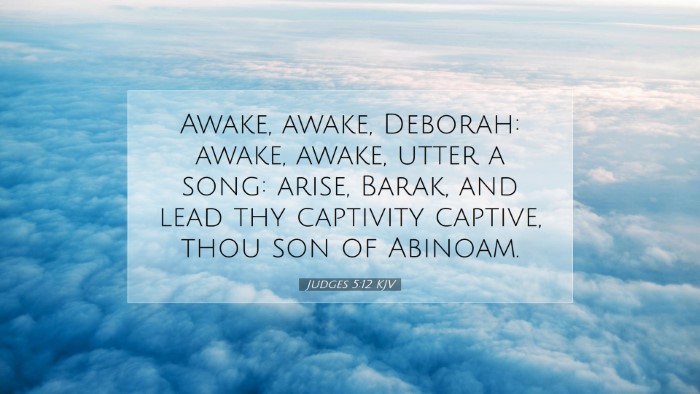Judges 5:12 - An Exposition and Commentary
Judges 5:12 states: "Awake, awake, Deborah: awake, awake, utter a song: arise, Barak, and lead thy captivity captive, thou son of Abinoam." This verse is a poignant call to action, encapsulating the spirit of the victory won by the Israelites with Deborah as a key leader. It serves as an invitation not only to Deborah but also to Barak, urging them to celebrate and commemorate the triumph God has granted over their enemies.
Contextual Overview
The verse appears in the Song of Deborah, a victory hymn that celebrates God’s intervention in delivering Israel from the oppression of Jabin, the king of Canaan. This song emphasizes the roles of Deborah and Barak in the delivering of Israel, highlighting themes of divine providence and national restoration.
Historical Context
Matthew Henry notes that this era of Israel's history was characterized by disobedience and oppression, as they repeatedly fell into sin, invoking God's anger. In this bleak backdrop, Deborah emerges as a prophetess and judge, emphasizing the progressive revelation of women in leadership roles within Israel's spiritual narrative.
Interpretation of Key Terms
- Awake: This call is both literal and metaphorical, serving to awaken not only Deborah but also the people of Israel to the reality of God’s deliverance. It signifies a stirring of spiritual enthusiasm and renewed commitment to God.
- Utter a Song: Songs in the biblical context often serve as expressions of worship and testimony. The instruction to "utter a song" reflects the need for the people to vocalize their praise and acknowledgment of God's sovereignty.
- Lead thy captivity captive: Adam Clarke interprets this as a military call to not only celebrate the victory achieved but also to pursue the enemy, emphasizing the complete defeat of those who oppressed God’s people.
Theological Implications
From a theological perspective, this verse highlights the role of divine intervention in human affairs. Albert Barnes emphasizes God's sovereignty in orchestrating events for the deliverance of Israel, thus affirming His ultimate control over all nations. The awakening signifies a divine initiative, prompting leaders and followers alike to respond actively and faithfully.
Leadership Insights
Deborah’s dual role as a leader and a prophetess is significant. It illustrates the multifaceted nature of leadership within God’s Kingdom. Pastors and church leaders can glean valuable insights from Deborah’s example; she did not shy away from the challenges of leadership and remained steadfast in her faith in God’s promises, which is an essential quality for modern spiritual leaders.
Celebration of Victory
The song's call to celebration reflects a broader practice within Scripture of responding to God’s deliverance with corporate worship. Worship following victory is an essential aspect of faith life, as seen in other biblical instances, such as after the crossing of the Red Sea (Exodus 15) or after the return from exile (Ezra 3). This verse prompts congregations to remember and proclaim the victories God has achieved among them.
Practical Applications
- Call to Action: Just as Deborah and Barak were called to take action, believers today are reminded to awaken to the calling of God in their lives—actively participating in God's work within their communities.
- Corporate Worship: The emphasis on song encourages congregations to prioritize worship as a collective act of remembrance and celebration, fostering unity and gratitude among members.
- Embrace God-given Roles: The example of Deborah challenges traditional views of leadership in faith communities, prompting a recognition of the diverse ways God can use individuals for His purposes.
Conclusion
Judges 5:12 serves as a rich source of inspiration for pastors, students, and theologians alike. The themes articulated through the verse—including awakening, leadership, celebration, and active response to God’s faithfulness—remain pertinent today. As believers reflect on these concepts, they are encouraged to remain vigilant and responsive to God's calling in their lives and ministries, ensuring that they, too, contribute to the ongoing story of redemption and deliverance God writes through His people.


